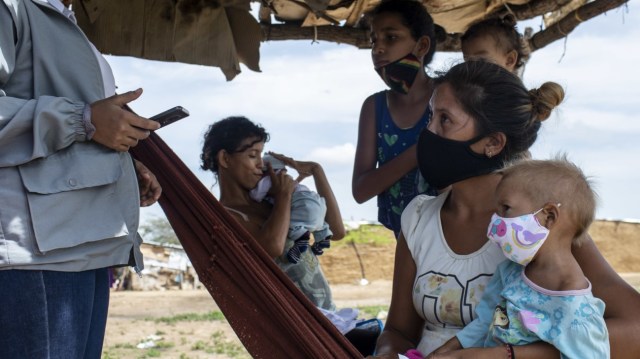
A nine-month-old baby dies at the border of Bolivia and Chile along with two adults. A child and a teenager are shot dead in Colombia. Women and children living on the streets are attacked and their belongings burned in northern Chile. They are all Venezuelan people in situations of extreme vulnerability, whom governments in the Américas have not wanted, or known how, to protect.
By Amnesty – Clara del Campo
Nov 10, 2021
Newspaper headlines around the world have captured in painful detail the massive human rights violations that are taking place in Venezuela. However, the tragedies endured by those fleeing these horrors have generated less visibility and less condemnation. The most recent cases are only examples, but the challenges extend to the militarisation of borders in Perú, shipwrecks and forced returns from Trinidad and Tobago, and separation of families in Curaçao, among others. This is a trend that the region must urgently stop and reverse.
Nearly six million people have fled Venezuela since 2015, equivalent to 20% of the country’s population. In other words, one in five people have left their homes behind. It is as if the entire population of Denmark or Singapore, for example, had fled their country in search of protection. It is an extremely painful reality: millions of people who, having suffered so much in their own country, see no other way out than to leave their home, in the hope that other countries will offer them international protection.
When we talk about international protection, or refugee status, most people conjure up images of armed conflicts far from our borders. But two clarifications should be made. The first is that, in much of our region, and in particular in countries that host Venezuelans, there is a definition of a refugee that recognises as such those fleeing not only persecution and armed conflict, but also massive human rights violations. The second is that international protection implies, in its most basic essence, assistance and reception. That means protecting the human rights of those who have had no choice but to leave or cannot return home. This is without prejudice to other inescapable obligations of receiving states, such as the universal prohibition on returning a person to a territory where there is a real risk of serious human rights violations.
In Venezuela it is more than proven that massive human rights violations are committed. Therefore, Venezuelan people outside their country require international protection, no matter what. Why, then, does a nine-month-old baby die in Bolivia? Why does a group of highly vulnerable refugees watch in terror as their few precarious belongings are burned? Why are a 12-year-old boy and an 18-year-old boy shot dead?
The failure of states to protect those fleeing human rights violations in Venezuela is palpable. One telling statistic is the lack of funding to address the rights and needs of Venezuelan people. On average, Venezuelan refugees receive 265 US dollars per person in donations from the international community, while those from Syria receive 3,150 US dollars in assistance. Needless to say, no one life is worth more than another, just that states need to act accordingly.
The lack of official recognition of refugee status for Venezuelans and the lack of adequate funding to assist them are not unrelated facts. It is a multidimensional denial of the nature, scale and response to the world’s second largest human mobility crisis. If the need for international protection is not recognised, how will further abuses and tragedies like those we have seen in Chile, Colombia, Bolivia, among others, be prevented? And if these people are not recognised as refugees, how can the requirements of a response plan to such a refugee crisis be funded?
Governments in the Américas, and in other regions, cannot forsake their obligations under international human rights and refugee law. They must do the right thing: recognise Venezuelans as refugees in order to address their rights in an urgent and differentiated manner, and consequently request and receive the necessary funding to do so.
…
Read More: Amnesty – The world cannot fail those fleeing the crisis in Venezuela
…

